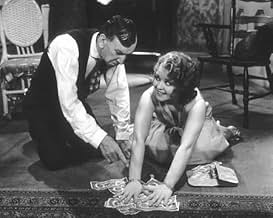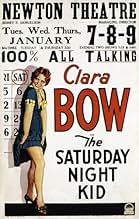Ajouter une intrigue dans votre langueMayme and sister Janie are salesgirls in Ginsberg's Department Store. Mayme is in love with store clerk Bill, but Janie tries to steal him from her. Hazel, another salesgirl, is Jean Harlow'... Tout lireMayme and sister Janie are salesgirls in Ginsberg's Department Store. Mayme is in love with store clerk Bill, but Janie tries to steal him from her. Hazel, another salesgirl, is Jean Harlow's first credited role.Mayme and sister Janie are salesgirls in Ginsberg's Department Store. Mayme is in love with store clerk Bill, but Janie tries to steal him from her. Hazel, another salesgirl, is Jean Harlow's first credited role.
Alice Adair
- Girl
- (non crédité)
Ernie Adams
- Gambler
- (non crédité)
Irving Bacon
- McGonigle
- (non crédité)
Getty Bird
- Riche Ginsberg
- (non crédité)
Eddie Dunn
- Jim
- (non crédité)
Bess Flowers
- Customer
- (non crédité)
Mary Gordon
- Reducing Customer
- (non crédité)
Jean Harlow
- Hazel
- (non crédité)
Leone Lane
- Pearl
- (non crédité)
Frank Ross
- Ken
- (non crédité)
Commentaire à la une
Most of the plot revolves around a New York City department store - "Ginsberg's" - that like so many department stores up until the middle of the 20th century were run by the actual founder of the same name. There is an actual Mr. Ginsberg in the cast. It reminds me a little of "It's a Great Life" made the same year, although the sisters working at Ginsberg's here are hardly the Duncan sisters as far as teamwork and sister love. It does gives you a feel for what a dictatorship these big dynastic department stores were at that time. They apparently paid people a living wage, but a living wage was considered enough to make it sharing a room in a cheap boarding house, as sisters Mayme Barry (Clara Bow) and Janie Barry (Jean Arthur) are doing here.
The gist of the story is that Mayme and Janie are clerks at Ginsberg's. Mayme is called "The Saturday Night Kid" because she hardly ever misses going out on a Saturday night - until she meets fellow clerk William Taylor (James Hall). Mayme's personality is defined by loyalty and sensitivity when hurt by those she cares about, although she puts on a hard shell to pretend nothing hurts her. Jean Arthur, as sister Janie is the sneak. She's weak and selfish, and is capable of being a weasel and a liar to get out of a bad situation. She feels bad about it later, she just has no spine or character.
Now Mayme has fallen hard for Bill, but after he becomes a floorwalker - a big promotion in those days - he gets snooty with her and hurts her badly. She breaks up with him. Sister Janie has always had a crush on Bill, and although she doesn't outright try and steal him from Mayme, she tells some lies to make herself look good at Mayme's expense, to the point of getting Mayme possibly sent to jail! What do I mean by this and how does all of this work out? Watch and find out.
My favorite scene - Mayme is having the gang from work over to her apartment and they have a kind of dining room situation on the roof outside their window with the Brooklyn Bridge in the background. The way the conversation flows between characters is quite mature considering this is the first full year of talking pictures.
One more thing, even though to me it was a tie as to whether Clara Bow or Jean Arthur owned this picture - Clara with her wise flapper persona and Jean with this whiny unlikeable character she plays that makes you scratch your head when you think about all of the wise likable parts that were to come, Edna May Oliver sure takes the cake with an early performance as a supervisor at Ginsberg's in this, only her first sound performance. You can really see the comic potential there, and apparently so could RKO, because they snapped her up immediately afterward.
The gist of the story is that Mayme and Janie are clerks at Ginsberg's. Mayme is called "The Saturday Night Kid" because she hardly ever misses going out on a Saturday night - until she meets fellow clerk William Taylor (James Hall). Mayme's personality is defined by loyalty and sensitivity when hurt by those she cares about, although she puts on a hard shell to pretend nothing hurts her. Jean Arthur, as sister Janie is the sneak. She's weak and selfish, and is capable of being a weasel and a liar to get out of a bad situation. She feels bad about it later, she just has no spine or character.
Now Mayme has fallen hard for Bill, but after he becomes a floorwalker - a big promotion in those days - he gets snooty with her and hurts her badly. She breaks up with him. Sister Janie has always had a crush on Bill, and although she doesn't outright try and steal him from Mayme, she tells some lies to make herself look good at Mayme's expense, to the point of getting Mayme possibly sent to jail! What do I mean by this and how does all of this work out? Watch and find out.
My favorite scene - Mayme is having the gang from work over to her apartment and they have a kind of dining room situation on the roof outside their window with the Brooklyn Bridge in the background. The way the conversation flows between characters is quite mature considering this is the first full year of talking pictures.
One more thing, even though to me it was a tie as to whether Clara Bow or Jean Arthur owned this picture - Clara with her wise flapper persona and Jean with this whiny unlikeable character she plays that makes you scratch your head when you think about all of the wise likable parts that were to come, Edna May Oliver sure takes the cake with an early performance as a supervisor at Ginsberg's in this, only her first sound performance. You can really see the comic potential there, and apparently so could RKO, because they snapped her up immediately afterward.
Histoire
Le saviez-vous
- AnecdotesThe dress that Jean Harlow wears in the pageant scene was intended for 'Clara Bow', but Bow had gained too much weight to fit into it, so she convinced designer Edith Head to let the unknown actress to wear it. Harlow never forgot the favor.
- Versions alternativesA silent version was released released simultaniously, with titles by Joseph L. Mankiewicz, for theaters that were not yet equipped for sound.
- ConnexionsFeatured in Hollywood (1980)
Meilleurs choix
Connectez-vous pour évaluer et suivre la liste de favoris afin de recevoir des recommandations personnalisées
Détails
- Date de sortie
- Pays d’origine
- Langue
- Aussi connu sous le nom de
- The Saturday Night Kid
- Lieux de tournage
- Société de production
- Voir plus de crédits d'entreprise sur IMDbPro
- Durée1 heure 3 minutes
- Couleur
Contribuer à cette page
Suggérer une modification ou ajouter du contenu manquant

Lacune principale
By what name was La cadette (1929) officially released in India in English?
Répondre



































